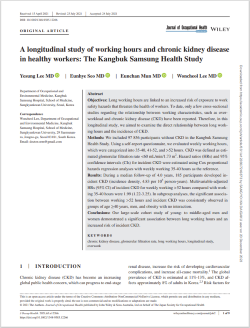#0134 Don’t Let Them Fail: Work Pressure Bringing You One Step Closer to Chronic Kidney Disease

Don’t Let Them Fail: Work Pressure Bringing You One Step Closer to Chronic Kidney Disease
Chronic kidney disease (CKD) has been identified as a major public health issue worldwide. CKD is associated with risk factors which include cardiovascular and metabolic diseases like hypertension, diabetes mellitus, and obesity. While the global prevalence of CKD is estimated to be 11–13%, it affects roughly 8% of Korea's adult population.
South Korea is also one of the countries with the longest working hours, which may severely impact the health of its people. Although researchers have demonstrated that CKD is linked to a lack of physical fitness induced by excessive work hours, the link between CKD and work attributes remains uncertain.
A group of scientists attempted to assess this association by performing a large-scale, unbiased investigation. A total of 97,865 adults (both male and female and older than 18 years of age) working in various industries participated in the study. All the participants had previously been examined for health criteria, including proper kidney function, as part of the Kangbuk Samsung Health Study. They were asked to respond to questions about their working hours, shifts, and workplace pressures. The responses were recorded and classified as "high" or "low" occupational stress.
The findings suggested that long work hours, particularly during daytime shifts, are linked to stress. Long working hours were also found to be linked to men's proclivity for smoking, alcohol usage, and hypertension. Reducing work hours, on the other hand, encouraged more activity and slowed down the ageing process.
The researchers also found that men aged 40 and over were at a considerably higher risk of getting CKD if they worked more than 52 hours per week, based on the 185 CKD cases identified in the study. The incidence of CKD was much lower in those who worked 35–40 hours per week. Although it is well known that kidney function declines beyond the age of 40, surprisingly, the incidence of CKD was higher in younger women than in younger men.
In summary, the researchers established a direct link between overwork and the development of CKD. Long work hours can lead to a sedentary lifestyle, which can in turn lead to metabolic and cardiovascular problems. It is therefore imperative to strive for a healthy work-life balance across various sectors, as well as to successfully manage health issues that can cause kidney damage.

Link to the original journal article:
https://academic.oup.com/joh/article/63/1/e12266/7249873
Title of the paper:
A longitudinal study of working hours and chronic kidney disease in healthy workers: The Kangbuk Samsung Health Study
Authors:
Yesung Lee, Eunhye Seo, Eunchan Mun, and Woncheol Lee




